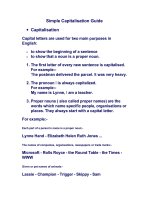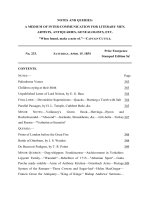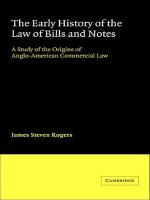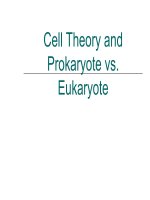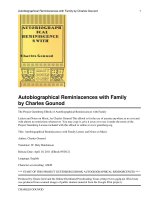- Trang chủ >>
- Đề thi >>
- THPT Quốc Gia
s1015 notes
Bạn đang xem bản rút gọn của tài liệu. Xem và tải ngay bản đầy đủ của tài liệu tại đây (209.15 KB, 3 trang )
STUDY NOTES
EPISODE 15: SEA FLOOR
ORDERING ADJECTIVES
STUDY TIPS
In both the Writing and Speaking modules
of the IELTS test, it may be necessary to
provide descriptions of people, places and
things. This is an important skill in
communication.
To write good descriptions, it is necessary
to organise the descriptions logically, and to
provide specific details.
These study notes focus on the order in
which you would need to place adjectives
before a noun when describing someone or
something.
Adjectives are used for descriptions, and
precede the noun they modify or qualify.
When a series of adjectives are used, they
are generally put in a certain order. This is
sometimes called the Royal Order of
Adjectives.
There are generally 6 categories and 4 subcategories that define the Word Order of
Adjectives:
1.
2.
3.
4.
5.
6.
7.
In IELTS Writing Task 1, it is
important to use adjectives to
describe the kind of changes and/or
trends found in graphs, tables or
charts.
Adjectives are equally important in
IELTS Writing Task 2 and the
Speaking test, when describing
persons, places or things. This
provides the opportunity to present
a broad range of vocabulary
discussing the various IELTS topics
whether relating to the
environment, education, society,
etc.
In formal academic writing
remember to limit your descriptions
to two or three adjectives. In a
literary or poetic style of writing, it is
more acceptable to use longer
strings of adjectives.
Determiner/Number
Opinion/Observation
Physical Description: Size, Age, Shape, Colour
Origin
Material
Qualifier/Compound Noun/-ing Nouns
Head Noun
Page 1 of 3
WORD ORDER OF ADJECTIVES
Determiner
Number
Opinion
Observation
the
a (an)
my
her
their
three
(a) few
half (of)
first
third
each
Darwin’s
Pasteur’s
satisfactory
useful
comfortable
interesting
inexpensive
charming
appalling
exciting
boring
beautiful
lovely
delicious
intelligent
nice
awful
Physical Description
Size
petite
tiny
small
diminutive
little
microscopic
miniature
huge
gigantic
enormous
big
large
sizable
spacious
queen-size
king-size
Age
old
elderly
mature
adult
ancient
antique
centenarian
ageless
geriatric
young
new
immature
under-aged
juvenile
adolescent
minor
modern
Shape
short
long
square
oval
round
spiral
spherical
triangle
oblong
circular
rectangular
cubic
cylindrical
geometric
heart-shaped
flat
Colour
white
cream
black
jet black
grey
blue
indigo
violet
purple
pink
red
reddish
magenta
green
emerald
yellow
orange
Origin
Material
Australian
English
Chinese
Indonesian
Aboriginal
Thai
Japanese
Korean
Indian
Renaissance
Olympic
European
French
American
Canadian
silk
porcelain
gold
silver
wooden
metal
plastic
copper
leather
glass
steel
aluminium
concrete
ivory
oak
maple
teak
mahogany
Qualifier
Compound
Noun*
-ing nouns
business
dining
motor
baseball
football
dining
fashion
dressing
building
Head Noun
* Compound nouns consist of two or more nouns. The first part of the phrase describes the use, type or purpose of the Head
Noun. For example, wrist watch, head band, microwave oven, disc player, key ring, wedding ring
The adjectives are always in the singular, for example expensive business suits
It is best to avoid long strings of adjectives as this may sound unnatural in English. Limit your descriptions to two, three or
maximum four adjectives.
Page 2 of 3
Punctuation of adjectives
A comma can be used between two adjectives if they belong to the same category, for example a big, spacious room
EXAMPLES
WORD ORDER OF ADJECTIVES
Determiner
Number
Opinion
Observation
many
Pasteur’s
interesting
the
two
a
terrifying
expensive
Physical Description
Size
huge
vast
Age
Origin
Shape
Material
Qualifier
Compound
Noun
Colour
new
old
steel
blue
building
Pacific
business
microscopic
Head Noun
oval
Chinese
Page 3 of 3
glass
lectures
theory
materials
Ocean
ventures
design

